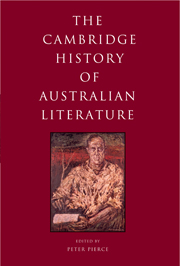Book contents
- Frontmatter
- Introduction
- FROM EUROPEAN IMAGININGS OF AUSTRALIA TO THE END OF THE COLONIAL PERIOD
- FROM THE LATE NINETEENTH CENTURY TO 1950
- TRAVERSES
- FROM 1950 TO NEARLY NOW
- 17 Publishing, patronage and cultural politics: Institutional changes in the field of Australian literature from 1950
- 18 Theatre from 1950
- 19 The short story since 1950
- 20 Scribbling on the fringes: Post-1950 Australian poetry
- 21 Groups and mavericks
- 22 The challenge of the novel: Australian fiction since 1950
- 23 The novel, the implicated reader and Australian literary cultures, 1950–2008
- 24 Nation, literature, location
- Select bibliography
- Index
- References
22 - The challenge of the novel: Australian fiction since 1950
from FROM 1950 TO NEARLY NOW
Published online by Cambridge University Press: 28 May 2011
- Frontmatter
- Introduction
- FROM EUROPEAN IMAGININGS OF AUSTRALIA TO THE END OF THE COLONIAL PERIOD
- FROM THE LATE NINETEENTH CENTURY TO 1950
- TRAVERSES
- FROM 1950 TO NEARLY NOW
- 17 Publishing, patronage and cultural politics: Institutional changes in the field of Australian literature from 1950
- 18 Theatre from 1950
- 19 The short story since 1950
- 20 Scribbling on the fringes: Post-1950 Australian poetry
- 21 Groups and mavericks
- 22 The challenge of the novel: Australian fiction since 1950
- 23 The novel, the implicated reader and Australian literary cultures, 1950–2008
- 24 Nation, literature, location
- Select bibliography
- Index
- References
Summary
Modernism in a modern nation
Australia’s foundation as a secular democratic state in 1901 made it a nation committed to modernity and the principles of the Enlightenment. Rational principles of state organisation and an accompanying confidence in scientific and technological progress have established Australia as a stable nation-state that provides considerable material benefits to its people. Even in such an isolated place as Australia, however, the experiences of the 20th century – particularly two world wars and intervening economic depression – undermined confidence in the powers of democratic order and the future promised by technology. The novel, the literary genre most associated with the Enlightenment in Europe, has often carried progressive ideas to a popular audience. After World War II it also became a source of challenge to those ideas. Modernism in Australian art emerged relatively late in the 20th century, but its critical attitude to modernity and its distrust of rational thinking is evident in many Australian novels written after the war. The ambivalent attitude of Australian writers to modernity is expressed repeatedly in the novels published after Patrick White’s in the 1950s, and White is a pivotal figure in the development of the Australian novel since World War II.
White transformed the possibilities for the Australian novel by demonstrating that it was a place to test ideas against complex spiritual, psychological and emotional experience, not only an avenue for national storytelling. His series of brilliant novels established the form as the dominant literary mode to express the shifting intellectual debates and allegiances of contemporary times. It has remained a source of opposition to dominant assumptions about Australian life, and a means of wayward commentary on the more rational and established ideas about what such life may mean.
- Type
- Chapter
- Information
- The Cambridge History of Australian Literature , pp. 498 - 516Publisher: Cambridge University PressPrint publication year: 2009
References
- 2
- Cited by



